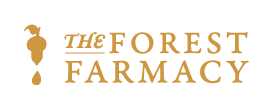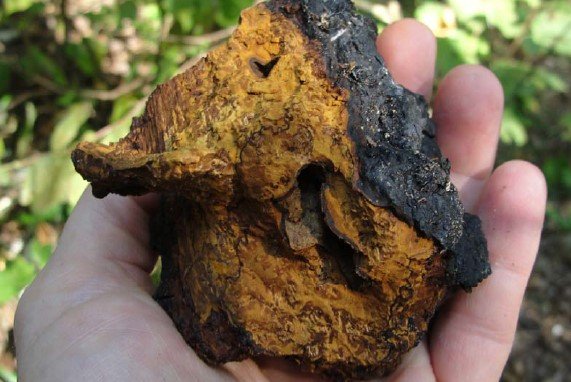Chaga Medicinal Benefits
Chaga growing wild on a birch tree
For thousands of years, the Chaga mushroom, also known as Inonotus obliquus, has been adored in Russia, Korea, Eastern and Northern Europe, Northern America, the North Carolina highlands, and Canada. It is known as “God's Gift” or the “King of Herbs” [1]. Chaga was used to cure many diseases in traditional and herbal medicine across Northern and Eastern Europe, as well as in China, where it’s been used for thousands of years. The term Chaga comes from the Russian word “czaga,” [1] which is derived from the Greek word “fungus”. In cold climates, Chaga is a fungus that grows on the trunks of adult birch trees.
The first known documentation of the use of Chaga in Chinese medicine was the first century BCE [7]. Locals in Siberia's alpine region drank Chaga tea every day, inhaled Chaga, and cooked Chaga in hot water to use topically on the skin. Chaga translates to “cancer polypore” in Norwegian because of its fungal appearance and alleged medicinal properties [1].
Chaga mushroom
Chaga’s properties
Both in vitro and in vivo, chaga exhibits anticancer, anti-mutagenic, antiviral, antiplatelet, anti-diabetic [6], antioxidant, analgesic, immunomodulating, anti-inflammatory, and pain-relieving properties. Chaga has anti-allergic, cognition-enhancing, and antioxidant properties in animal models, as well as anti-inflammatory properties against experimental colitis. Chaga polysaccharides were demonstrated to improve exercise endurance and biological indices of weariness when taken orally.
Furthermore, Chaga extracts and their constituents have inhibitory and pro-apoptotic effects on cancer cells from the colon, lung, and liver [2]. Chaga's inotodiol was found to have anticancer properties in cervical cancer cells. Chaga has been shown in certain studies to cause selective apoptosis in tumor cells while not affecting healthy cells. Melanoma cell growth was suppressed in animal models. However, no clinical trials have been conducted to determine the safety or efficacy of chaga for the prevention or treatment of cancer, cardiovascular disease, or diabetes [2]. The effects of Chaga extract for psoriasis were published in the Russian journal Vestnik Dermatologic I Venerologii in 1973 [1].
Chaga and SARS-CoV-2
Inonotus obliquus (IO), a Chaga mushroom, was identified as one of the promising candidates against the SARS-CoV-2 virus [3]. In vivo animal studies have shown that bioactive mycochemical elements of Inonotus obliquus have immunomodulatory, antibacterial, and antiviral capabilities and that they aid in the fight against COVID-19 [4].
Chaga and cancer
Experts in China and Japan investigated the anticancer qualities of polysaccharides present in Chaga, comparing the results to chemotherapy and radiation but without the negative effects. The polysaccharides in Chaga have been demonstrated to have powerful anti-inflammatory and immune-balancing characteristics, which may drive the body to manufacture natural killer (NK) cells, among its many other benefits. Natural killer cells are immune cells that fight infections and tumor growth [2].
In 1958, Finnish and Russian researchers discovered that Chaga had anticancer properties for breast, liver, uterine, and stomach cancers, as well as being useful for complications of diabetes and hypertension.
Chaga is the most potent anticancer medicinal fungus known, according to David Winston, an herbalist, and ethnobotanist with almost 40 years of experience in Cherokee, Chinese, and Western herbal traditions [2]. Alexandr Solzhenitsyn, a Russian Nobel Prize laureate, also wrote about the medical usage of Chaga in hospitals in the region of Tashkent in his 1968 semi-autobiographical novel Cancer Ward [1].
Anti-inflammatory & Antioxidant Properties
Chaga is a viable alternative treatment for osteoarthritis and high blood pressure due to its anti-inflammatory and antioxidant properties. It may also aid in the reduction of low-density lipoprotein (LDL), known as bad cholesterol [5]. Chaga includes a variety of minerals that might benefit your health, including antioxidants and B-complex vitamins.
Chaga supports the immune system
Chaga has also been discovered to assist in regulating the body's production of cytokines (cells that affect other cells in the body) and reducing or eliminating swelling linked with illnesses like arthritis, according to research.
The immune system's biochemical messengers are referred to as cytokines. They're proteins that help the immune system's initial line of defense against a variety of ailments by activating white blood cells. Chaga aids the immune system by regulating cytokine synthesis and allowing cells to respond to each other [5]. Cytokines may be responsible for helping cure illnesses and infections varying from common colds to fatal illnesses.
How to take Chaga
Chaga is not suggested for eating, but can be consumed in the form of teas and certain other infused beverages [6]. It can be found in a variety of herbal beverages and supplements. Before taking Chaga supplements, talk to your doctor because they can mix with some drugs and cause adverse effects or allergic reactions in some people.
1 The History of Chaga in Herbal Medicine
www.thechagaco.com
2 Cancer-care integrative-medicine for chaga mushroom
3 The Antiviral, Anti-Inflammatory Effects of Natural Medicinal Herbs and Mushrooms and SARS-CoV-2 Infection pubmed.ncbi.nlm.nih.gov
4 Chaga Medicinal Mushroom Inonotus obliquus (Agaricomycetes) Terpenoids May Interfere with SARS-CoV-2 Spike Protein Recognition of the Host Cell: A Molecular Docking Study. International Journal of Medicinal Mushrooms
5 What are chaga mushrooms? Nutrition, benefits and risks
www.medicalnewstoday.com
6 Chaga: Are There Health Benefits?
www.webmd.coma
7 Chaga I White Rabbit Institute of Healing
https://www.whiterabbitinstituteofhealing.com/herbs/chaga/


